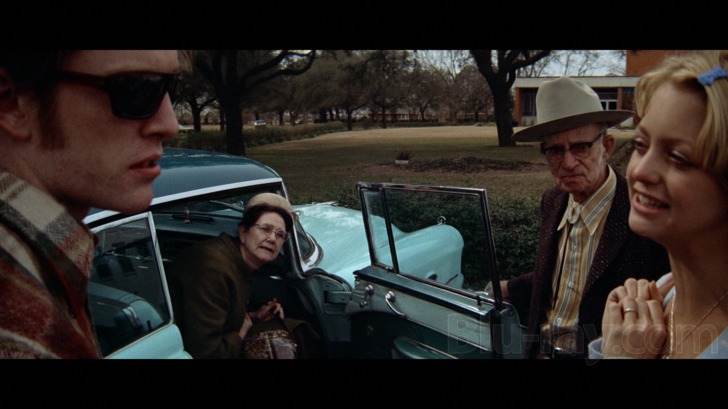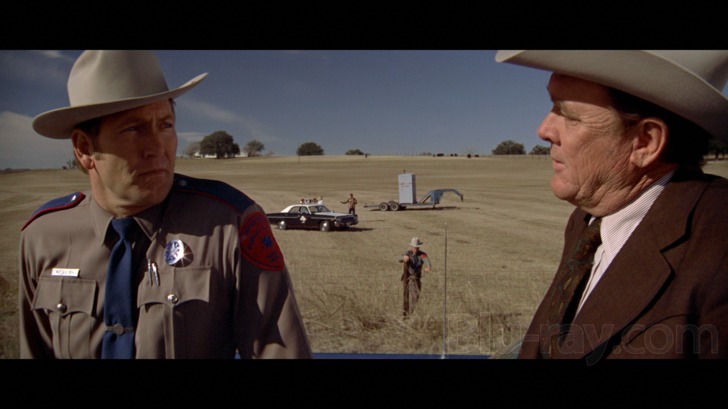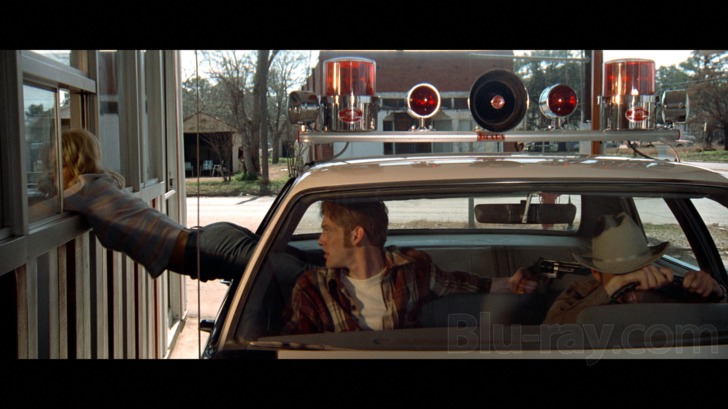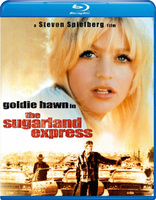The Sugarland Express Blu-ray Movie
HomeThe Sugarland Express Blu-ray Movie 
Universal Studios | 1974 | 110 min | Rated PG | May 05, 2015Movie rating
7 | / 10 |
Blu-ray rating
| Users | 4.5 | |
| Reviewer | 3.5 | |
| Overall | 3.5 |
Overview
The Sugarland Express (1974)
A woman attempts to reunite her family by breaking her husband out of prison and kidnapping their baby from his foster parents. But things don't go as planned and they are forced to take a cop hostage on the road.
Starring: Goldie Hawn, Ben Johnson, Michael Sacks, William Atherton, Gregory WalcottDirector: Steven Spielberg
| Crime | Uncertain |
| Adventure | Uncertain |
Specifications
Video
Video codec: MPEG-4 AVC
Video resolution: 1080p
Aspect ratio: 2.35:1
Original aspect ratio: 2.39:1
Audio
English: DTS-HD Master Audio 2.0 Mono (48kHz, 24-bit)
Spanish: DTS Mono
French: DTS Mono
Subtitles
English SDH, French, Spanish
Discs
50GB Blu-ray Disc
Single disc (1 BD)
Playback
Region free
Review
Rating summary
| Movie | 4.0 | |
| Video | 4.0 | |
| Audio | 4.0 | |
| Extras | 0.5 | |
| Overall | 3.5 |
The Sugarland Express Blu-ray Movie Review
Ninny and Clod
Reviewed by Michael Reuben October 21, 2014At the time of this review, The Sugarland Express was available on Blu-ray only as part of the Steven Spielberg Director's Collection. It is now separately available. Released two and a half years after the television premiere of Duel, The Sugarland Express was director Steven Spielberg's first theatrical film and, for those who saw it, confirmation that the fledgling director was one of the most innovative cinematic talents in years. It also demonstrated that the kid once known derisively on the Universal lot as "Scheinberg's Folly" (named after the president of Universal who gave Spielberg a contract at the age of 22) had the chops to oversee a massive production involving dozens of vehicles, hundreds of extras and elaborately choreographed action scenes. Spielberg's producers on the film, David Brown and Richard D. Zanuck, were sufficiently impressed to offer the young director as his next project the highly anticipated film adaptation of the bestseller Jaws, which made film history. Spielberg co-wrote the story of Sugarland with Matthew Robbins, who would later direct The Legend of Billie Jean, and Hal Barwood, whose other screenplays include the cult favorite Dragonslayer, also co-written and directed by Robbins. Loosely based on an actual incident from 1969—much more loosely than the opening title card suggests—the film stands apart from Spielberg's early work for its lack of sentimentality and pessimistic tone. From a technical standpoint, Sugarland marks Spielberg's full emergence as one of modern cinema's leading populist entertainers, but the story itself reflects a bleak perspective that would not fully reappear in Spielberg's work for many years.

The Sugarland Express is essentially a chase film, though with numerous detours and pauses along the way. (The word "express" in the title should be taken ironically.) The people being chased are a young Texas couple, Lou Jean and Clovis Poplin (Goldie Hawn and William Atherton). Both Lou Jean and Clovis have records for minor felonies. When their son, Baby Langston, is placed in foster care with a solidly middle class family, the Loobys (Louise Latham and Merrill Connally, whom Spielberg later cast in Close Encounters of the Third Kind as a team leader), Lou Jean insists that Clovis help her retrieve their son. She insists to the point of breaking her hen-pecked husband out of minimum security "pre-release" confinement and driving off with the parents of another inmate. Their eventual destination is the Looby home in Sugarland. Through a series of mishaps, the Poplins end up taking hostage Patrolman Maxwell Slide (Michael Sacks) of the Texas Dept. of Public Safety and commandeering his cruiser. Like almost everything the Poplins do, capturing a peace officer is a bad idea, because it brings the entire DPS charging after them in pursuit, along with every other law enforcement agency in the vicinity, as well as a few stray cops from neighboring Louisiana, a horde of press and, by the end, a handful of civilian police reservists who think it would be fun to bag some bad guys. As the procession swells across the Texas landscape, the Poplins become instant celebrities, greeted by well-wishers in the small towns through which they pass, all of which gives Lou Jean in particular a renewed sense of confidence in the righteousness of her cause. (Today she'd use cell phone videos and a YouTube channel to court the same favor, and the cycle of celebrity would turn much faster and reach a much wider audience, but the basic mechanism hasn't changed.) If there's a hero in The Sugarland Express, it's DPS Captain Tanner, who is played with taciturn gravitas by Ben Johnson, an authentic cowboy who became an actor working for John Ford, then won an Oscar for The Last Picture Show. It is Tanner who first recognizes that Clovis and Lou Jean are "just a coupla kids" with no real understanding of the trouble they're in, and you can see the dark clouds swirling around his weatherbeaten brow as the hope of a peaceful resolution gradually slips away under the relentless pressure of too many people and too many loose cannons. From the moment Tanner learns that one of the men under his command has been taken hostage—and interrupts courtroom testimony to take charge of the operations personally—there's little doubt that he will do whatever is necessary to protect Officer Slide and get him back safely. But unlike so many of his colleagues, the captain would prefer that no one else get hurt in the process. Utilizing all of the experience he gained on Duel and taking full advantage of new possibilities offered by the latest lightweight Panaflex camera, Spielberg stages one scene after another of cars flying along highways and back roads, often while characters talk and interact within and between vehicles. He is equally adept at slowing down the action, while a fleet of police cars waits idling for some reason or another, which may be as trivial as a stop for gas. In one of the film's most memorable sequences, he choreographs a wild shootout that feels like utter chaos, even though, as a viewer, you always know exactly what's happening.
The Sugarland Express Blu-ray Movie, Video Quality 

The Sugarland Express was Spielberg's first collaboration with Hungarian DP Vilmos Zsigmond, with whom he would reunite for Close Encounters of the Third Kind, for which Zsigmond would win an Oscar for cinematography. Sugarland was made before home video began making directors and cameramen wary of using the full 2.35:1 frame to its best advantage, lest too much be cut off in panning 'n' scanning for the home screen. As a result, Spielberg's and Zsigmond's compositions are often striking in their use of the entire frame. Universal's 1080p, AVC-encoded Blu-ray is consistent with the other films new to Blu-ray in the Steven Spielberg Director's Collection, which is to say that it's an overall faithful presentation, with only minor evidence of digital manipulation to compromise its film-like appearance. The film's grain pattern appears to be largely intact and natural, although the coarsening that is sometimes a sign of artificial sharpening appears from time to time. Contrast is sometimes understated, and levels of black aren't always well-differentiated, but this may be inherent to the source, reflecting limitations in the location photography and/or compromises required for the slower anamorphic lenses of the era. In most shots, however, fine detail is remarkably good, allowing the viewer to savor Spielberg's complex compositions, in which people and objects are frequently arrayed across the frame in different planes but all in focus. (In one famous shot at the Looby house, the focus changes radically during the course of a shot; it's the equivalent of a camera move without moving the camera.) The strongest colors in Sugarland tend to be red and blue, consistent not only with the flashing lights of the police vehicles but also with the peculiarly American streak of anti-authoritarianism that makes people sympathize with the Poplins during their fifteen minutes of fame. Otherwise, the film's palette reflects the dusty, dry surroundings of the Texas countryside. Universal has mastered The Sugarland Express with a generous bitrate of 36.04 Mbps, which is helpful given the film's many scenes with multiple moving elements (usually vehicles) in the frame.
The Sugarland Express Blu-ray Movie, Audio Quality 

The Sugarland Express was released in mono, and that track is included on Blu-ray in lossless DTS-HD MA 2.0 with identical left and right front channels. It's an effective and interesting mix, especially when Spielberg and his two editors (Edward M. Abroms and Verna Fields) are cutting back and forth between the chaos on the highway and the relative quiet of the Looby home. The road's combination of police sirens, screeching tires, shouted conversation and radio chatter is expertly balanced, and the occurrences of gunfire have surprisingly solid impact for a track of this era. The dynamic range is good enough to do justice to the numerous demolition-derby-style collisions that are inevitable when so many vehicles come together at high speed. Sugarland's soundtrack is a prime example of why original mono mixes should be left alone. If they worked then, they still work now.
The Sugarland Express Blu-ray Movie, Special Features and Extras 

Except for a trailer (480i; 1.85:1, and obviously squeezed; 3:19), the disc has no extras. I do not have Universal's 2004 DVD, but as far as I have been able to determine, it was similarly bare.
The Sugarland Express Blu-ray Movie, Overall Score and Recommendation 

The conventional wisdom on Spielberg (which he has sometimes encouraged in interviews) is that he began his career with a child's perspective, crafting thrill rides and fairy tales for the kid in all of us and only later maturing into the pessimistic artist who stared evil in the face in Schindler's List, showed us the hell of battle in Saving Private Ryan and expressed anxiety about the future in such films as Munich and Minority Report. This alleged arc of artistic evolution is neat and tidy, but it doesn't account for The Sugarland Express, in which the technique of a precocious populist entertainer is melded to an already mature perspective, one that views Clovis and Lou Jean sympathetically as the overgrown children they are but doesn't excuse their mistakes. Spielberg has said that the true villains of the film are the people who encourage the couple's delusion that their ill-conceived plan has any chance of success. Given how the cult of instant celebrity has evolve since Sugarland, the film was remarkably prescient. Its director and co-writer may have been young, but he was no starry-eyed innocent. Highly recommended.
Similar titles
Similar titles you might also like

Always
1989

The Chase
Limited Edition to 3000
1966

A Perfect World
1993

The Getaway
1972

Thelma & Louise 4K
1991

Welcome to New York
2014

The Chase
1994

Stagecoach
1939

Carlito's Way 4K
1993

I Am a Fugitive from a Chain Gang
1932

Good Time
2017

Room
2015

In Cold Blood
1967

Ain't Them Bodies Saints
2013

Desperate Hours
MVD Rewind Collection
1990

The Whole Town's Talking
Limited Edition to 3000
1935

Cool Hand Luke 4K
1967

Hounds of Love
2016

Lost Horizon
1937

Across the Line: The Exodus of Charlie Wright
2010

